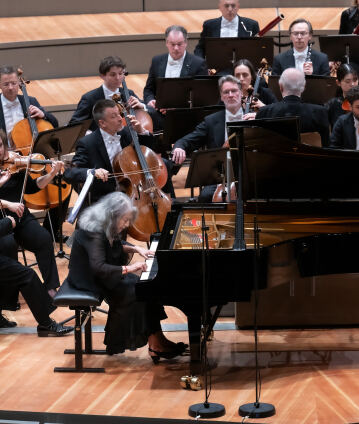Daniel Barenboim and Martha Argerich

Daniel Barenboim and Martha Argerich with the Berliner Philharmoniker delivered an “exceptional evening that will not be forgotten” (Berliner Zeitung). The two international stars, who have known each other since childhood, performed Beethoven’s Second Piano Concerto. Under the direction of Daniel Barenboim – honorary conductor of the Berliner Philharmoniker – the programme also included Johannes Brahms’s Third Symphony, which shifts between major and minor keys.
Beethoven’s Second Piano Concerto is chronologically actually his First; he wrote it in his Bonn home before moving to Vienna. Compared to his four other contributions to the genre, it is rarely played today. One wonders why: the first movement offers both seriousness and pianistic brilliance, the Adagio captivates with song-like intimacy and the finale, marked by rhythmic wit, forms an impressive conclusion – especially when an artist as creative as Martha Argerich sits at the piano. Less than a year after her performance of Schumann’s Piano Concerto, the world-renowned pianist returns to the Berliner Philharmoniker. This time, too, the Philharmoniker’s honorary conductor Daniel Barenboim will be at the helm, who Argerich has been friends with for decades, both personally and artistically.
What distinguishes Brahms’s Third from his other three symphonies is, at first glance, above all its ending: after dramatic climaxes, the basic key of F major asserts itself in the finale, but the composition slowly fades in pianissimo without a showy final element. The famous violinist and Brahms friend Joseph Joachim spoke of a “redemption in its dying away”. Another striking feature of the symphony is its delightful ambivalence of tonality, a constant shifting between major and minor, which can already be heard in the first three chords. In contrast to the emotionally charged outer movements, the Andante and the graceful, melancholy Poco Allegretto have the character of enchanting intermezzi.
© 2023 Berlin Phil Media GmbH
Artists
Our recommendations
- Simon Rattle and Daniel Barenboim with Bartók’s Piano Concerto No. 1
- Simon Rattle and Daniel Barenboim play Brahms
- Claudio Abbado conducts a Strauss gala for the 1992 New Year’s Eve Concert
- 1994 Europakonzert from Meiningen with Claudio Abbado and Daniel Barenboim
- Europakonzert from Athens with Simon Rattle and Daniel Barenboim
- Kirill Petrenko and Daniel Barenboim